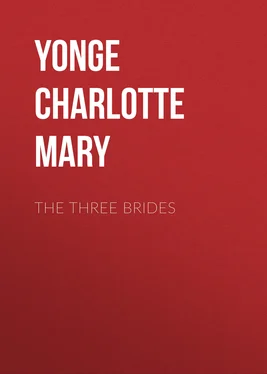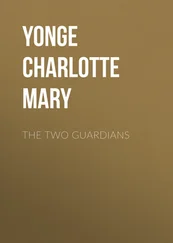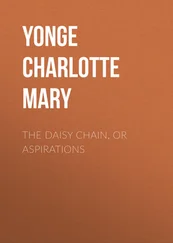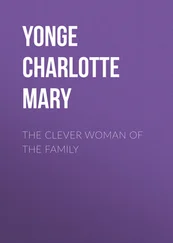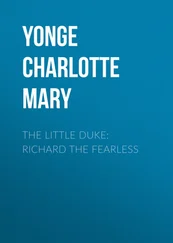Charlotte Yonge - The Three Brides
Здесь есть возможность читать онлайн «Charlotte Yonge - The Three Brides» — ознакомительный отрывок электронной книги совершенно бесплатно, а после прочтения отрывка купить полную версию. В некоторых случаях можно слушать аудио, скачать через торрент в формате fb2 и присутствует краткое содержание. Жанр: foreign_prose, literature_19, Европейская старинная литература, foreign_antique, на английском языке. Описание произведения, (предисловие) а так же отзывы посетителей доступны на портале библиотеки ЛибКат.
- Название:The Three Brides
- Автор:
- Жанр:
- Год:неизвестен
- ISBN:нет данных
- Рейтинг книги:4 / 5. Голосов: 1
-
Избранное:Добавить в избранное
- Отзывы:
-
Ваша оценка:
- 80
- 1
- 2
- 3
- 4
- 5
The Three Brides: краткое содержание, описание и аннотация
Предлагаем к чтению аннотацию, описание, краткое содержание или предисловие (зависит от того, что написал сам автор книги «The Three Brides»). Если вы не нашли необходимую информацию о книге — напишите в комментариях, мы постараемся отыскать её.
The Three Brides — читать онлайн ознакомительный отрывок
Ниже представлен текст книги, разбитый по страницам. Система сохранения места последней прочитанной страницы, позволяет с удобством читать онлайн бесплатно книгу «The Three Brides», без необходимости каждый раз заново искать на чём Вы остановились. Поставьте закладку, и сможете в любой момент перейти на страницу, на которой закончили чтение.
Интервал:
Закладка:
He and Rosamond were bent on a tour of parochial inspection, as were Raymond and Cecil on a more domestic one, beginning with the gardens.
Cecil was the first lady down-stairs, all in claret colour trimmed with gray fur, with a little fur and velvet cap upon her head.
“There! it is a clear morning, and you can see the view,” said Raymond, opening the hall door.
“Very prettily undulating ground,” she said, standing on the steps, and looking over a somewhat rapid slope scattered with trees to the opposite side of the valley, where a park with a red mansion in the midst gleamed out among woods of green, red, orange, and brown tints. “How you are shut in! That great Spanish chestnut must be a perfect block when its leaves are out. My father would never let it stand so near the house.”
“It is too near, but it was planted at the birth of my mother’s brother.”
“Who died?”
“Yes, at seven years old. It was her first grief.”
“Then it would vex her if you cut it.”
Raymond laughed. “It is hers, not mine.”
“I forgot.” There was a good deal in the tone; but she added, “What is that place opposite?”
“Sirenwood. It belongs to Sir Harry Vivian; but he does not live there.”
“Yes, he does,” said Cecil. “Your brothers say he has come back with his two daughters.”
“There is only one unmarried.”
“There is a widow come to keep house for him—Lady Tyrrell.”
“Very likely,” said Raymond; “my mother only writes with difficulty, so I hear little when I am from home.”
“Is it true that they are horrid people, very dissipated, and not fit for me to associate with?”
“That is putting it strongly,” said Raymond, quietly. “They are not likely to be very desirable acquaintances for you, but there is no reason you should not associate with them on ordinary terms of courtesy.”
“Ah! I understand—as member’s wife.”
“I don’t see what that has to do with it,” said Raymond. “Ah! Rosamond!” as she came down in a Galway cloak over her black velveteen, “on the way to view your domain?”
“Yes, and yours,” she said, nodding to Cecil. “You appreciate such English apple-pie order. It looks as if you never suffered a stray leaf to dance without an old woman to hunt it down. And what’s that red house smiling across the valley?”
“Sirenwood,” repeated Raymond; then to Julius he said, “Did you know it was inhabited again?”
“Frank said so,” answered Julius, without further remark, giving his arm to his wife, who clasped both hands on it; while the other couple looked on as if doubtful whether this were a trying duty incumbent on them.
“What is it all about?” said Rosamond, as they walked down the avenue of walnuts leading to the iron gates in the opposite direction from Sirenwood. “Which of you was that woman ’ s victim? Was it a sailor love of Miles’s? I hope not! That poor little African might not stand a gay ghost cropping up again.”
“Miles is far removed from the conventional sailor.”
“Then it is reduced to the grave Raymond.”
“I wish I had betrayed nothing.”
“Now you may as well proceed to betray the rest, instead of leaving me to exercise my fancy.”
“It is no secret, only such things are best not brought up again. Camilla Vivian was poor Raymond’s grande passion , and you may imagine what a grief that was to my mother, especially as the poor brother was then living—one of the most fascinating, dangerous men I ever saw; and the whole tone of the place was ultra gay and thoughtless, the most reckless extravagance. However, he was set upon it, and my mother was forced to consent to the engagement. She seemed equally devoted to him, till she met Lord Tyrrell at some country house, and then a quarrel was picked, either by her mother or herself, about my mother retaining the headship of her own house. It was a palpable excuse, but it served to break the affair off, and Raymond was cruelly cut up. My mother made herself everything to him from that moment, gave up all her former habits to be with him, sent the little boys to school, and fairly dragged him through the trouble!”
“How long ago was it?”
“Ten years—yes, ten years. So far as ceasing to care a straw for a heartless woman like that, he has got over it, no doubt; but it has made a graver man of him for life, and I doubt whether, but for my mother’s accident, he ever would have married.”
“Did you marry for your mother’s sake, Julius, or only tell her so?”
“For shame, my Lady Mischief!”
“And do you think the fair Camilla returned with plans that she finds disconcerted?”
“How can I tell? I have not seen her since I was a lad of eighteen.—Ah! how d’ye do, Betty?” in a tone of relief; “you’ve not seen my wife.”
This was the first of a long series of introductions. Compton Poynsett was a straggling village, with the church, schools, and Rectory, ten minutes’ walk from the park gates. It had not been neglected, so that Julius had not the doubtful satisfaction of coming like a missionary or reformer. The church, though not exactly as with his present lights he would have made it, was in respectable order, and contained hardly anything obnoxious to his taste; the schools were well built, properly officered, and the children under such discipline that Rosamond declared she could no more meddle with them than with her father’s regiment.
The Rectory was at that moment level with the ground, and Julius explaining the plans, when up came the senior curate. Mr. Bindon, whom she, as well as Julius, greeted as an old friend, was the typical modern priest, full of his work, and caring for nothing besides, except a Swiss mountain once a year; a slight, spare, small, sallow man, but with an enormous power of untiring energy.
Scarcely had Rosamond shaken hands with him, standing where her drawing-room rug was to be in future days, when a merry whistle came near, and over the wall from the churchyard leapt first a black retriever, secondly a Skye terrier, thirdly a bull ditto, fourthly a young man, or rather an enormous boy, who for a moment stood amazed and disconcerted at the unexpectedly worshipful society into which he had jumped!
“Ha! Herbert! is that you?” laughed Julius.
“I beg your pardon!” he breathlessly exclaimed. “I was just taking the short cut! I had no idea—Here, Mungo, you ruffian!” as the Skye was investigating Lady Rosamond’s boot.
“Oh, I like him of all things! I am glad to welcome you to our future house!” as she held out her hand to the Reverend Herbert Bowater, the junior curate, a deacon of a fortnight’s standing, whose round open happy blue eyes, ruddy cheeks, merry lips, and curly light hair, did not seem in keeping with the rigidly straight collar and waistcoat, and the long black coat, at present plentifully streaked with green tree-moss, while his boots and trousers looked as if they had partaken of the mud-bath which his dogs had evidently been wallowing in.
“Off! off!” were his words, as he shook hands with his rectoress. “Get away, Rollo!” with an energetic shove of the foot to the big dog, who was about to shake his dripping coat for the ladies’ special benefit. “I saw you arrive last evening,” he said, in the conversational tone of a gentlemanly school-boy; “didn’t you find it very cold?”
“Not very. I did not see you, though.”
“He was organizing the cheers,” said Mr. Bindon. “You shone in that, Bowater. They kept such good time.”
“You were very good to cheer us at all,” said Julius, “coming in the wake of the Squire as we did.”
“The best of it was,” said the junior, “that Charlie was so awfully afraid that he and poor Miles’s wife would be taken for the Squire, that he dashed in on his way to warn me to choke them off. If she hadn’t been ill, I must have set the boys on for a lark! How is she, though?” he asked in a really kind tone.
Читать дальшеИнтервал:
Закладка:
Похожие книги на «The Three Brides»
Представляем Вашему вниманию похожие книги на «The Three Brides» списком для выбора. Мы отобрали схожую по названию и смыслу литературу в надежде предоставить читателям больше вариантов отыскать новые, интересные, ещё непрочитанные произведения.
Обсуждение, отзывы о книге «The Three Brides» и просто собственные мнения читателей. Оставьте ваши комментарии, напишите, что Вы думаете о произведении, его смысле или главных героях. Укажите что конкретно понравилось, а что нет, и почему Вы так считаете.
